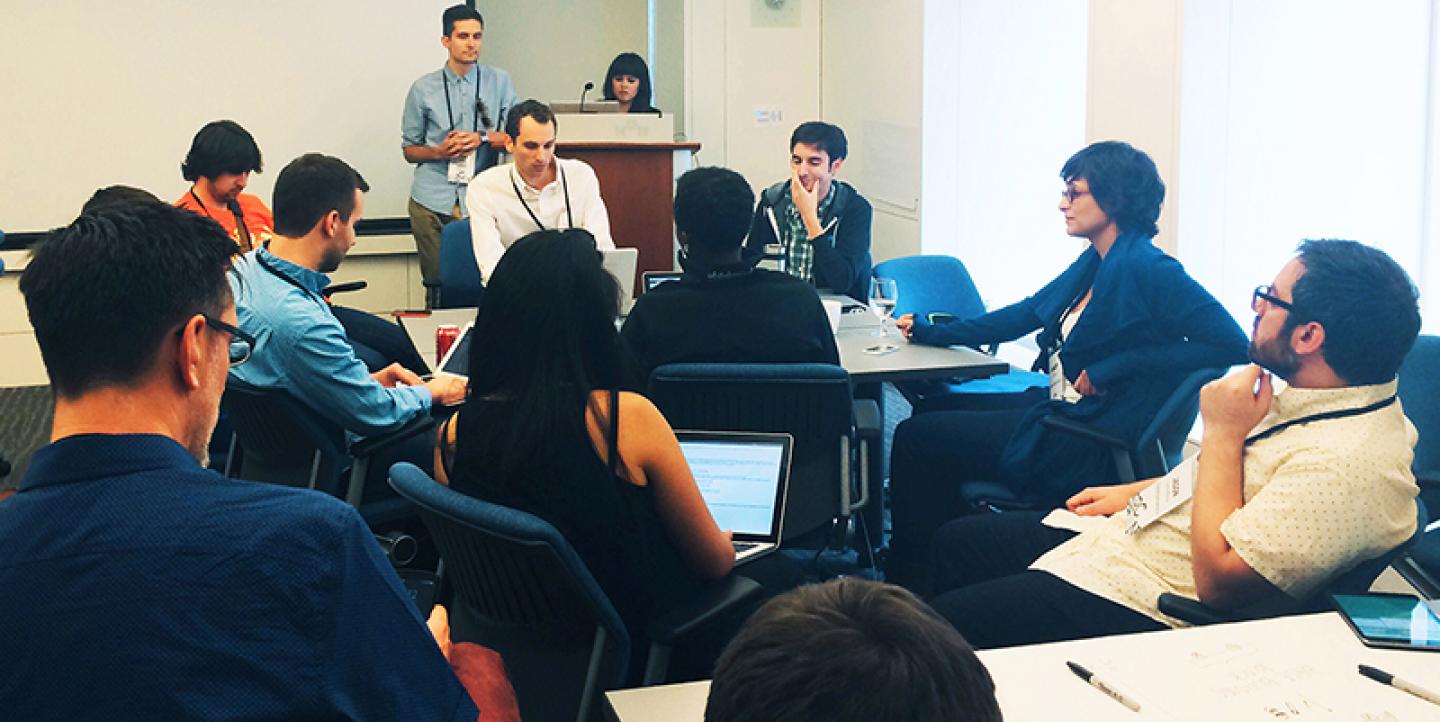This post originally appeared on Northwestern University's Knight Lab and is republished on IJNet with permission.
There seems to be an uptick of production in digital storytelling: More and more newsrooms are beginning to build longform editorial pieces on the web, with designs that break out of their day-to-day article templates.
Web developers in newsrooms sometimes find themselves struggling to meet growing editorial demand for special treatment on story projects, sometimes by copy-and-pasting previous code in order to meet a deadline. These efforts to “make it work with longform” have begged discussions on how to scale design processes and whether to consider various tools that can help speed up the process of project creation.
In thinking about how to scale special editorial projects as well as work efficiently and at scale at Vox Media, Lauren Rabaino and Scott Kellum led a discussion on this topic at Knight-Mozilla OpenNews’ inaugural #SRCCON conference.
Design is an integral part of storytelling, but to design each and every story for its content creates a near inconceivable amount of work, given the volume of content from the average media outlet. Newsroom story cycles move quickly and produce mass volumes of content, and developers are expensive. Therefore, it is important to consider a sustainable approach when building and designing special stories.
How can newsroom developers meet editorial demands and build epic longform pieces, but make it in a scalable way?
In this discussion, previously Editorially’s, now Vox’s Jason Santa Maria offered a metaphor to explain the issue by comparing building longforms to building pinewood derbies. Every kid starts with the same building blocks, but with a saw, some paint, and lots of imagination, every kid’s pinewood derby turns out differently on race day. Same as in building longforms, creating blocks that are reusable and sustainable can make life a lot easier, and could be done in a way that does not stifle innovation.
A number of newsrooms have created methods in helping scale longform pieces. The Chicago Tribune newsroom development team has their own forked version of the Twitter Bootstrap responsive framework, styled and customized to fit their own needs. When starting a project, developers won’t have to re-style parts of the projects that are consistent like the navigation and branding. This along with their pre-baked flask template allows their team to start projects with minimal effort.
At Vox Media, the Chorus CMS includes code snippets which allows editors to create blocs in longform pieces for example inserting pull quotes, photo blocks or graphics, with minimum involvement of developers. For example, the recent Amazon Fire Phone Review from the Verge was done without any involvement from the product team.
Allen Tan at the New York Times shared their ranking system that is inspired by college sports. When a tool or feature is first introduced, it is considered junior varsity. When it is reused over and over again, it moves up to varsity level and is given more care and attention. He referenced Snowfall which The New York Times spent months working on with a dedicated team, but something similar can now be accomplished in a week.
For more day-to-day graphics, Emma Carew from Foreign Policy shared a spreadsheet in which they quantify time, process, tools for different types of graphics. This streamlines the process of editors working with web producers to create graphics, and both editorial and graphics would have similar expectations of the process and outcome.
The discussion wrapped up on the topic of users, both in terms of communication with editorial staff about internal processes or involving users in the editorial cycle. While these tools and add-ons can automate the process of project creation, it is important to consider user engagement, and the purpose of certain projects, art direction and design should be used wisely to help users become more engaged with the content.
Notes from the session are available and the discussion will hopefully continue so that newsrooms can share with each other what works and what doesn’t. What is your newsroom doing to scale longform projects?
Northwestern University Knight Lab advances news media innovation and education. Developing ideas from experimentation through adoption, the Lab makes technology that aims to help make information meaningful and promotes quality storytelling on the Internet.
KK Rebecca Lai is from Hong Kong, currently experiencing American culture through college. A visual journalist, she is interested in design and how stories are told through different mediums.
Image by Ramla Mahmaood via Knight Lab.

